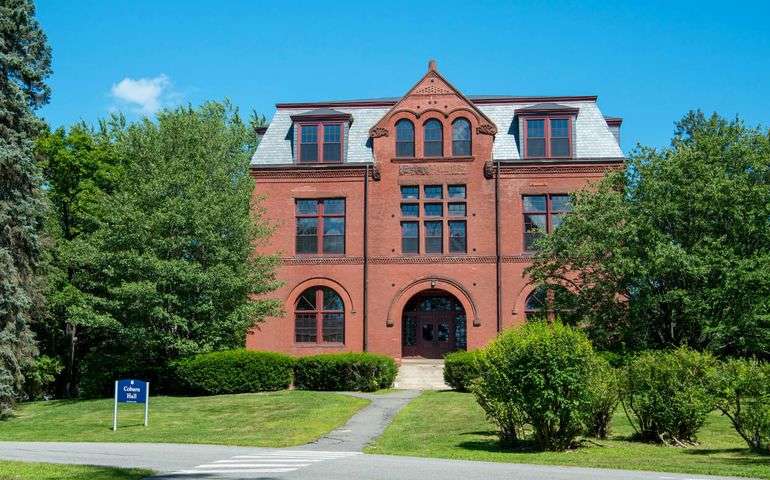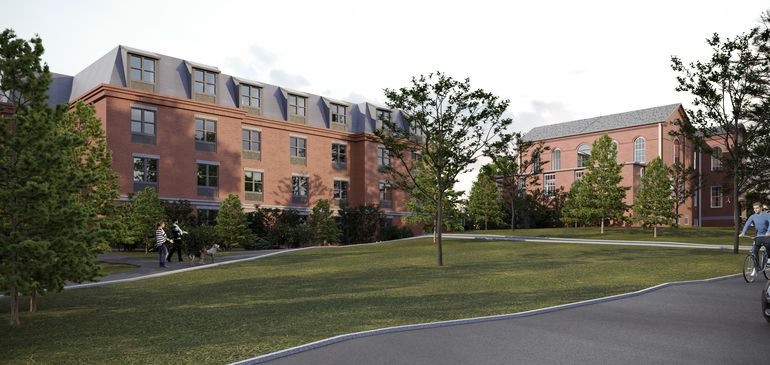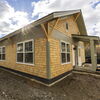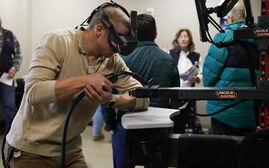
UMaine plan to convert iconic buildings into campus hotel moves forward
 COURTESY / Radnor Property Group & Harrison Street
A rendering shows the 24,800-square-foot addition to Holmes Hall, looking toward the southeast.
COURTESY / Radnor Property Group & Harrison Street
A rendering shows the 24,800-square-foot addition to Holmes Hall, looking toward the southeast.
Two of the oldest buildings on the University of Maine campus in Orono will undergo a $28 million transformation to become an 95-room boutique hotel, thanks to a public-private partnership forged by the university, a Chicago investment management firm, and a Philadelphia real estate development company.
Harrison Street, a Chicago investment management firm exclusively focused on alternative real assets, today announced it has formed a joint venture with Radnor Property Group, a Philadelphia real estate development company with a strong presence in higher education public-private partnership projects in the Northeast, to rehabilitate and expand two historic buildings centrally located on the University of Maine’s flagship Orono campus.

The joint venture is the first public-private partnership for the University of Maine System and is fully contracted through a 99-year ground lease, according to a news release.
Built in 1888, Coburn Hall and Holmes Hall, which have been non-operational for the past 15 years, will be converted into a boutique, on-campus hotel with 95 hotel rooms and suites and a bistro cafe.
The two halls were built 20 years after the university — then known as Maine State College of Agriculture and the Mechanic Arts — enrolled its first students. Coburn originally housed the school’s agriculture and natural history departments, while Holmes contained labs for agricultural experiments and soon became home to the chemistry department.
Both halls display the Romanesque architectural style of the time, and in 1978 were among 10 UMaine buildings designated a historic district by the National Register of Historic Places.
The buildings together offer 33,000 square feet of space.
Located on the University Mall at the center of campus, the rehabilitation will provide UMaine with a hospitality offering to support UMaine’s student recruitment, alumni outreach, athletic and community collaboration needs.
The project is scheduled to begin construction this fall, with a planned opening in early 2024.
As part of the partnership, the project will offer workforce development and internship programs in collaboration with regional tourism and hospitality programs to help prepare and develop young professionals in the industry.
The long-term partnership with Harrison Street and Radnor “stands to help UMaine continue to build upon the success and growth of our campus and community,” said Joanne Yestramski, University of Maine’s vice president and chief business officer.
The buildings are certified historic structures, and the redevelopment plan will meet the National Park Service standards for rehabilitation. The property will be operated by Portland-based Olympia Hotel Management, which operates campus hospitality services in the U.S.
Two Portland firms will be involved in construction: Archetype Architects is designing the project and Wright-Ryan Construction will serve as construction manager.
Harrison Street was established in 2005 and has invested across senior housing, student housing, healthcare delivery, life sciences and storage real estate as well as social and utility infrastructure. Headquartered in Chicago with offices in London, Toronto, San Francisco and Washington D.C., the firm has more than 220 employees and approximately $50 billion in assets under management. Clients of the firm include a global institutional investor base in North America, Europe, Middle East, Asia and Latin America.
Radnor specializes in the development of student housing, multifamily apartments and mixed-use projects. Radnor’s campus projects include redevelopment and new construction public-private-partnerships with higher education institutions. Founded in 1999, Radnor has developed or advised on assets valued at approximately $2 billion. Headquartered in suburban Philadelphia, it has regional offices in Atlanta and Hanover, N.H.













0 Comments